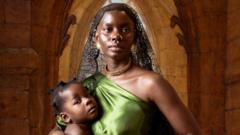Dola, who built her photography career in Lagos, turned her camera on herself and launched a project revealing the complexities of motherhood and mental health. With mounting recognition, she aims to break the stigma around postnatal depression, especially for black women, advocating for a more supportive and understanding environment.
In September 2020, Dola Posh welcomed her daughter Monioluwa into the world, yet her journey through motherhood was clouded by emotional challenges. Just days after, she found herself in the hospital battling feelings of isolation, particularly during the strict lockdown restrictions enforced due to COVID-19. The absence of family support and the weight of societal expectations led Dola into a dark place, as she grappled with her identity as a new mother and both professional and personal expectations.
Postnatal depression particularly affects black women, and Dola's experience mirrored that of many. Unsolicited advice from well-meaning relatives added to her distress, leaving her feeling inadequate and uncertain in her role as a mother. The pressures mounted until one harrowing night, overwhelmed with despair, Dola contemplated ending her life. It was in this moment of vulnerability that she reached out for help, leading her to a therapist who offered a new perspective: to channel her emotions through photography.
The act of photographing herself and her daughter served as a poignant reminder of both her struggles and her resilience. By integrating elements from her upbringing, like the visual representations of mother and child prominent in her religious background, Dola carved out a creative space that both confronted her pain and honored her motherhood.
As her project progressed, Dola began to understand her emotional landscape better and embraced her role as an artist and mother. Her willingness to share her experiences helped to dissipate the shame surrounding mental health struggles, especially in her community.
Dola’s work has garnered accolades, including a grant that supports her continued exploration of this subject, emphasizing her commitment to encourage conversations around the challenges of motherhood. Her vision extends beyond her personal journey; she seeks to empower other black mothers to recognize their struggles and pursue healing without stigma.
In conclusion, Dola Posh’s story is a powerful reminder of the importance of open dialogue about mental health, particularly for marginalized communities. Through her lens, she captures not only the challenges but also the beauty of motherhood, forging a path for others to follow in finding their truth amid adversity.
In September 2020, Dola Posh welcomed her daughter Monioluwa into the world, yet her journey through motherhood was clouded by emotional challenges. Just days after, she found herself in the hospital battling feelings of isolation, particularly during the strict lockdown restrictions enforced due to COVID-19. The absence of family support and the weight of societal expectations led Dola into a dark place, as she grappled with her identity as a new mother and both professional and personal expectations.
Postnatal depression particularly affects black women, and Dola's experience mirrored that of many. Unsolicited advice from well-meaning relatives added to her distress, leaving her feeling inadequate and uncertain in her role as a mother. The pressures mounted until one harrowing night, overwhelmed with despair, Dola contemplated ending her life. It was in this moment of vulnerability that she reached out for help, leading her to a therapist who offered a new perspective: to channel her emotions through photography.
The act of photographing herself and her daughter served as a poignant reminder of both her struggles and her resilience. By integrating elements from her upbringing, like the visual representations of mother and child prominent in her religious background, Dola carved out a creative space that both confronted her pain and honored her motherhood.
As her project progressed, Dola began to understand her emotional landscape better and embraced her role as an artist and mother. Her willingness to share her experiences helped to dissipate the shame surrounding mental health struggles, especially in her community.
Dola’s work has garnered accolades, including a grant that supports her continued exploration of this subject, emphasizing her commitment to encourage conversations around the challenges of motherhood. Her vision extends beyond her personal journey; she seeks to empower other black mothers to recognize their struggles and pursue healing without stigma.
In conclusion, Dola Posh’s story is a powerful reminder of the importance of open dialogue about mental health, particularly for marginalized communities. Through her lens, she captures not only the challenges but also the beauty of motherhood, forging a path for others to follow in finding their truth amid adversity.





















